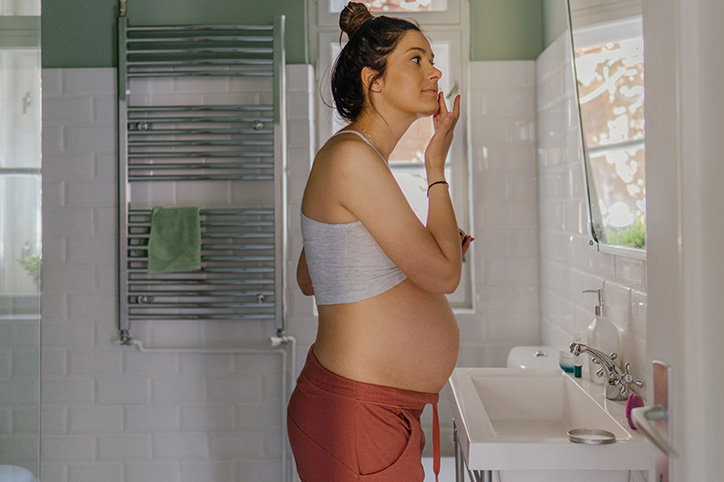Eczema is a common skin ailment that, if you’re not pregnant, can usually be quickly mitigated with an over-the-counter (OTC) treatment like hydrocortisone. When you’re pregnant, however, many of your go-tos may not be safe.
What causes eczema?
“When the skin barrier is healthy it can properly absorb moisture and block bacteria as well as other free radicals from entering the skin – eczema is a condition due to a gene variation that causes the skin to be unable to protect itself from allergens and irritants as usual,” says Dr. Stacy Chimento, a dermatologist at Riverchase Dermatology in Miami. “Eczema is also known as atopic dermatitis as ‘atopic’ is used to refer to allergies, so while eczema can present itself as red and itchy skin, many people with this condition also suffer from allergies or asthma.”
Eczema can be triggered by a variety of reasons like genetics, dry skin, weakened immune system or environmental factors like pollen and mold. “Fluctuations in hormones during pregnancy can aggravate eczema by making skin more itchy and inflamed,” says Dr. Chimento. “It may be helpful to keep skin extra moisturized in order to keep uncomfortable symptoms at bay.” She goes on to underline that it’s a fairly common side effect of pregnancy. In fact, she says, around half of all eczema cases are from women dealing with flare-ups during their pregnancy.
What are safe treatments for eczema when pregnant?
There are several options for OTC treatment for eczema when pregnant.
“Probiotics can help fight off harmful bacteria that come with flare-ups,” says Dr. Chimento. “It’s aadvised to stay hydrated so that the skin barrier stays moisturized. Taking warm showers with gentle cleansers as well as avoiding tight clothing may similarly help lessen symptoms.”
Dr. Chimento also notes that mild topical steroids are safe to use during pregnancy and can help lessen itching and burning. “Moreover, it may be helpful to use Ultraviolet B light therapy if steroids are not effective. UVB light is also safe for both the mother and the baby during pregnancy.”
If the aforementioned treatment options don’t work Dr. Chimento advises people to see a dermatologist for a customized treatment plan. “A doctor may prescribe both strong topical steroids as well as oral steroids. Cyclosporine is a medication known as an ‘immunosuppressant’ that can control the immune system to slow down symptoms of eczema.”
How should breastfeeding women treat eczema?
Unfortunately some women find that their symptoms do not go away after childbirth and they continue to have have flare-ups (sometimes around the breast or nipple) even while breastfeeding. “Most doctors will advise gentle moisturizes and mild topical steroids rather than oral antibiotics,” says Dr. Chimento. “However, it’s important to wash off all topical steroids before the baby breast feeds. Be sure to tell your doctor you are breastfeeding prior to starting any new medication.”
How should parents treat their baby’s eczema?
Eczema is very common in babies. More than half of all people with atopic dermatitis develop symptoms prior to one year of age. “Sometimes this type of eczema can last through a person’s childhood and adolescence and in rare cases, adulthood as well,” says Dr. Chimento.
Treating your baby’s eczema requires consistent care and a proper routine. “It’s advised to give your baby short, lukewarm baths and keep their skin moisturized with gentle and fragrance/dye free lotions. Dress your baby in loose fitting clothing so that their skin can breathe,” says Dr. Chimento. “Don’t forget to use sensitive laundry detergent on your baby’s clothing. Make sure your baby doesn’t become overheated as this can exacerbate symptoms. Don’t rub your baby’s skin too hard with towels and ensure that their fingernails are short enough to not scratch their sensitive skin. Cuts and scratches on skin with eczema can easily become inflamed and infected. In some cases it may be helpful to invest in mittens for your baby if they are left alone or sleeping.”
